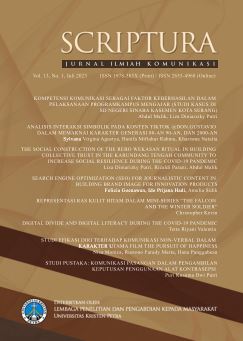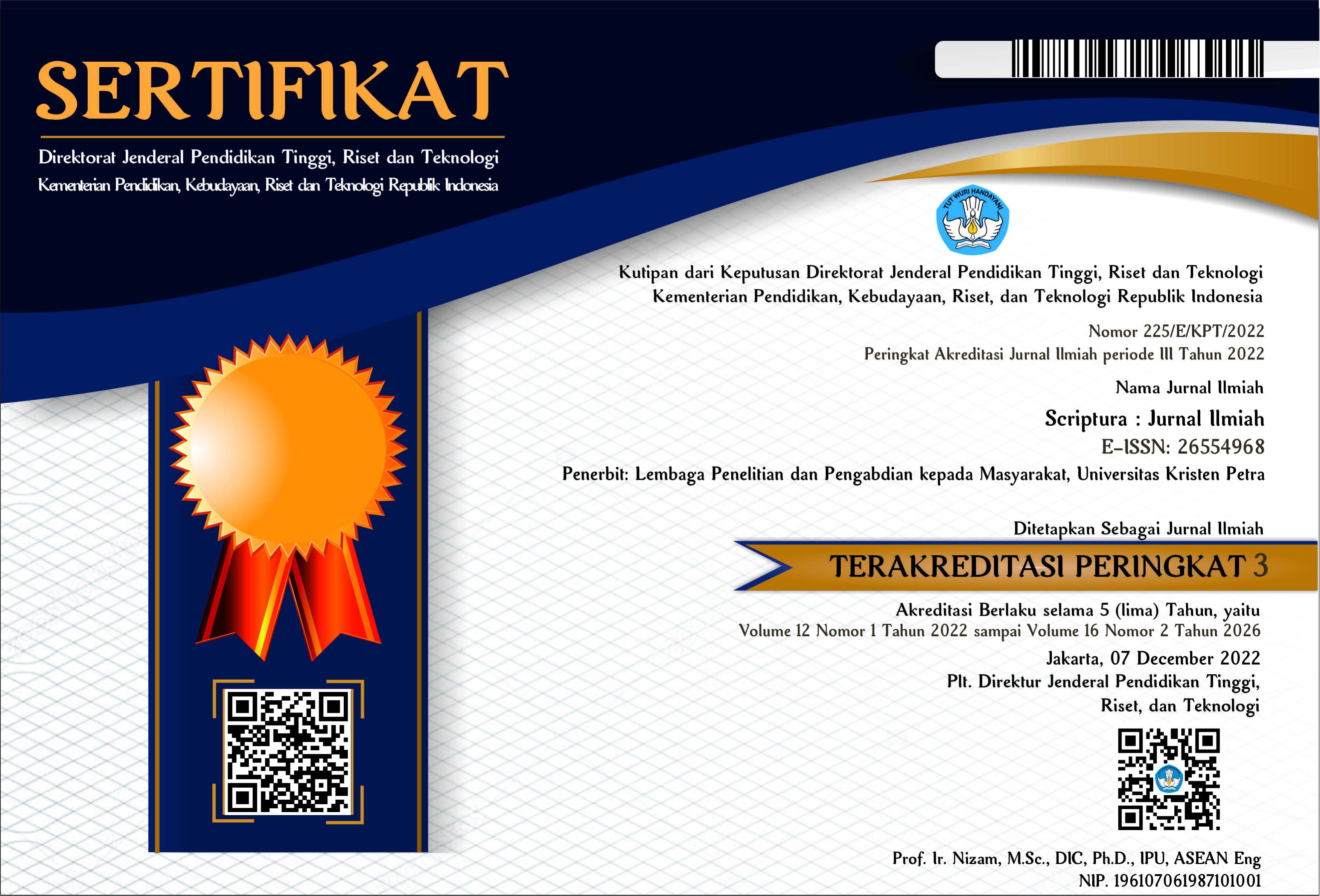Digital Divide and Digital Literacy During the Covid-19 Pandemic
DOI:
https://doi.org/10.9744/scriptura.13.1.69-78Keywords:
Communication, Digital divide, digital literacy, ICT, online learningAbstract
The Covid-19 pandemic has had a huge impact on the lives of people, where technology plays an important role in people’s daily lives, including the education sector. This is also reinforced by the rampant digital revolution (4.0) and triggers countries to prepare human resources that can compete in the global scope. This situation requires ICT skills that need to be possessed by every level of society. However, the development of ICT in Indonesia is still uneven and has resulted in a digital divide. Technology has been included in primary needs, and it is reflected in the education sector. This study aims to provide a comprehensive picture of the gap and digital literacy in online learning during pandemic. This study used a qualitative descriptive method where data were collected through literature study. The result of this study indicates that in general Indonesia has a diverse digital divide, ranging from ownership of access, the usage of ICT, to the quality of using ICT. This is inseparable from the differences in the geographical and socio-demographic conditions of the Indonesian. All efforts that have been planned and implemented are increasingly understood to be carried out properly, acceleration of digital literacy is the main key in dealing with the digital divide, especially in terms of education.
References
Afandi, Junanto, T., & Afriani, R. (2016). Implementasi Digital-Age Literacy dalam Pendidikan Abad 21 di Indonesia. In Prosiding Seminar Nasional Pendidikan Sains.
Allen, J. van. (2016). DEVELOPING DIGITAL LITERACY SKILLS THROUGH GUIDED READING INSTRUCTION. In The Florida Reading Journal (Vol. 51, Issue 1). www.kidrex.org
Ally, M. (n.d.). FOUNDATIONS OF EDUCATIONAL THEORY FOR ONLINE LEARNING.
Andrianto Pangondian, R., Insap Santosa, P., & Nugroho, E. (n.d.). Seminar Nasional Teknologi Komputer & Sains (SAINTEKS) Faktor-Faktor Yang Mempengaruhi Kesuksesan Pembelajaran Daring Dalam Revolusi Industri 4.0. https://seminar- id.com/semnas-sainteks2019.html
Anggraini, S., Kunci, K., & Literasi, : (2016). BUDAYA LITERASI DALAM KOMUNIKASI (Issue 3).
Arikunto, S. (2006). Metode Penelitian Kualitatif. Jakarta: Bumi Aksara.
Ariyanti, S. (n.d.). Studi Pengukuran Digital Divide di Indonesia Study Of Digital Divide Measurement In Indonesia.
Asmuni, A. (2020). Problematika Pembelajaran Daring di Masa Pandemi Covid-19 dan Solusi Pemecahannya. Jurnal Paedagogy, 7(4), 281. https://doi.org/10.33394/jp.v7i4.2941
Ayhan, B. (2019). Digital Literacy TRANSFORMATION OF SECRECY AND PRIVACY: SOCIAL MEDIA BEHAVIOR OF TURKISH AND KYRGYZ STUDENTS GİZLİLİK VE MAHREMİYETİN DÖNÜŞÜMÜ: TÜRK VE KIRGIZÖĚRENCİLERİN SOSYAL MEDYA DAVRANIŞLARI View project İletişim Sosyolojisi View project. https://doi.org/10.3726/978-3-653-07022- 4/10
Basilaia, G., & Kvavadze, D. (2020). Transition to Online Education in Schools during a SARS-CoV-2 Coronavirus (COVID-19) Pandemic in Georgia. Pedagogical Research, 5(4). https://doi.org/10.29333/pr/7937
Budhirianto Balai Pengkajian dan Pengembangan Komunikasi dan Informatika Bandung Jln Pajajaran, S. (2016). MODEL PEMBERDAYAAN RELAWAN TIK DALAM MENINGKATKAN E-LITERASI MASYARAKAT DI KOTA SUKABUMI ICT DEVELOPMENT MODEL OF VOLUNTEERS IN IMPROVING PUBLIC E-LITERACY IN THE CITY SUKABUMI (Vol. 5, Issue 2).
Camacho, K. (2005). Digital Divide, Multicultural Perspectives on Information Societies, C & F Editions ed.
Carducci, A., Federigi, I., Dasheng, L., Julian R, T., & Marco, V. (2020). Making waves: Coronavirus detection, presence and persistence in the water environment: State of the art and knowledge needs for public health. In Water Research (Vol. 179). Elsevier Ltd. https://doi.org/10.1016/j.watres.2020.1159 07
Chang, Y., Wong, S. F., & Park, M. C. (2016). A three-tier ICT access model for intention to participate online: a comparison of developed and developing countries. Information Development, 32(3), 226–242. https://doi.org/10.-1177/0266666914529294
Chen, W. (2004). The Global Digital Divide- Within and Between Countries. https://www.researchgate.net/publication/242208935 DIGITAL 2022. (n.d.).
Dijk, Van J. (2006). The Network Society. Second edition. London: Sage Publishing, Inc
Duraku, Z. H., & Hoxha, L. (n.d.). Chapter 1 The impact of COVID-19 on education and on the well-being of teachers, parents, and students: Challenges related to remote (online) learning and opportunities for advancing the quality of education. https://orcid.org/0000-0002-8268-3962
Faizah, U., Ambarwati, R., & Rahayu, D. A. (2021). From offline to online learning: Various efforts to secure the learning process during covid-19 outbreaks. Journal of Physics: Conference Series, 1747(1). https://doi.org/10.1088/1742- 6596/1747/1/012002
Gikas, J., & Grant, M. M. (2013). Mobile computing devices in higher education: Student perspectives on learning with cellphones, smartphones & social media. Internet and Higher Education, 19, 18–26. https://doi.org/10.1016/j. iheduc.2013.06.002
Hadisi, La., Muna, Wa. (2015). PENGELOLAAN TEKNOLOGI INFORMASI DALAM MENCIPTAKAN MODEL INOVASI PEMBELAJARAN ( E-LEARNING). Jurnal Al-Ta’dib.
Hadiyat Balai Besar Pengkajian dan Pengembangan Komunikasi dan Informatika Makassar Jl Abdurrahman Basalamah, Y. D. (2014). Kesenjangan Digital di Indonesia Digital Divide in Indonesia (Case Study in Wakatobi- Regency). In Jurnal Pekommas (Vol. 17, Issue 2).
Hameed, T. (n.d.). ICT as an enabler of Socio-Economic Development. http://en.wikipedia.org/wiki/Portal:Informa tion_technology
Hasugian, J. (2008). Urgensi Literasi Informasi dalam Kurikulum Berbasis Kompetensi di Perguruan Tinggi. In Jurnal Studi Perpustakaan dan Informasi (Vol. 4, Issue 2).
He, W., Xu, G., & Kruck, S. E. (n.d.). Online IS Education for the 21st Century.
JISC. (2017). Developing Digital Literacies. Jurnal, A.-H. :, Islam, S., Lalu, K. H.,
Muhammad, G., & Atsani, Z. (n.d.). TRANSFORMASI MEDIA PEMBELAJARAN PADA MASA PANDEMI COVID-19.
Khaleyla, F., Wisanti, W., Ambarwati, R., Rahayu, D. A., & Putri, E. K. (2021). Software preference for online learning of science and biology teachers under COVID-19 pandemic. JPBI (Jurnal Pendidikan Biologi Indonesia), 7(1), 35–42. https://doi.org/10.22219/jpbi.v7i1.14253
Kohnke, L., & Moorhouse, B. L. (2022). Facilitating Synchronous Online Language Learning through Zoom. In RELC Journal (Vol. 53, Issue 1, pp. 296–301). SAGE Publications Ltd. https://doi.org/10.1177/0033688220937235
Korucu, A. T., & Alkan, A. (2011). Differences between m-learning (mobile learning) and e-learning, basic terminology and usage of m-learning in education. Procedia - Social and Behavioral Sciences, 15, 1925–1930. https://doi.org/10.1016/j.sbspro.2011.04.029
Kumar, V., & Nanda, P. (2019). Social media in higher education: A framework for continuous engagement. International Journal of Information and Communication Technology Education, 15(1), 109–120. https://doi.org/10.4018/IJICTE.201901010 8
Lahti, M., Kontio, R., Pitkänen, A., & Välimäki, M. (2014). Knowledge transfer from an e- learning course to clinical practice. Nurse Education Today, 34(5), 842–847. https://doi.org/10.1016/j.nedt.2013.09.003
Madge, C., Breines, M. R., Dalu, M. T. B., Gunter, A., Mittelmeier, J., Prinsloo, P., & Raghuram, P. (2019). WhatsApp use among African international distance education (IDE) students: transferring, translating and transforming educational experiences. Learning, Media and Technology, 44(3), 267–282. https://doi.org/10.1080/17439884.2019.162 8048
Molnar, S. (2003). The explanation frame of the digital divide. Proceedings of the IFIP summer school ‘Risks and challenges of the networked society. Karlstad University.
August Muhajir & Afrianto, Damar Tri. (2020). Implementasi Blended Learning dalam Pendidikan Seni di Era New Normal. Journal of Arts and Design.
Nambiar, D. (2020). The impact of online learning during COVID-19: students’ and teachers’ perspective. Article in The International Journal of Indian Psychology. https://doi.org/10.25215/0802.094
Nazir, M. (2014). Metode Penelitian. Bandung: Ghalia Indonesia.
Pendidikan, K., & Jakarta, K. (2017). MATERI PENDUKUNG LITERASI DIGITAL.
Prakoso, B. S., & Januardy, R. (n.d.). CETAK BIRU PENGEMBANGAN TEKNOLOGI INFORMASI DAN KOMUNI-KASI (TIK) DEPDIKNAS disusun oleh: DIREKTORAT JENDERAL MANAJEMEN PENDIDIKAN DASAR DAN MENENGAH DEPARTEMEN PENDIDIKAN NASIONAL 2005. Putra (2009). (n.d.).
Putria, H., Maula, L. H., & Uswatun, D. A. (2020). Analisis Proses Pembelajaran dalam Jaringan (DARING) Masa Pandemi Covid- 19 Pada Guru Sekolah Dasar. Jurnal Basicedu, 4(4), 861–870. https://doi.org/10.31004/basi-cedu. v4i4.460
Putri, W. C. (n.d.). KESENJANGAN DIGITAL PADA KALANGAN REMAJA.
Restianty, A. (2018). Literasi Digital, Sebuah Tantangan Baru Dalam Literasi Media. Jurnal Gunahumas, 1(1), 72-87.
Salsabila, U., Irna Sari, L., Haibati Lathif, K., Puji Lestari, A., & Ayuning, A. (2020). Peran Teknologi Dalam Pembelajaran Di Masa Pandemi Covid-19. Al-Mutharahah: Jurnal Penelitian Dan Kajian Sosial Keagamaan, 17(2), 188–198. https://doi.org/10.46781/al- mutharahah.v17i2.138
Sezer, B. (2016). Faculty of medicine students’ attitudes towards electronic learning and their opinion for an example of distance learning application. Computers in Human Behavior, 55, 932–939. https://doi.org/10.1016/j.chb.2015.10.018
Shaleha, R. (n.d.). Konferensi Nasional Pendidikan I Prosiding
Stefany, S., & Nurbani, B. (n.d.). LITERASI DIGITAL DAN PEMBUKAAN DIRI: Studi Korelasi Penggunaan Media Sosial Pada Pelajar Remaja di Kota Medan. http://jurnal.unpad.ac.id/sosioglobal
Sugiyono. (2019). Metode Penelitian Kuantitatif, Kualitatif, dan R&D. Bandung: Alfabeta.
Sukmadinata, Nana Syaodih. (2009). Metode Penelitian Pendidikan. Bandung:Remaja Rosdakarya The Network Society Jan van Dijk Second Edition. (2006).
Walidin, W., Saifullah, & Tabrani. (2015). Metodologi Penelitian Kualitatif & Grounded Theory. FTK Ar-Raniry Press.
Wardani, Anita., Ayriza, Yuia. (2021). Analisis Kendala Orang Tua dalam Mendampingi Anak Belajar di Rumah Pada Masa Pandemi Covid-19. Jurnal Pendidikan Anak Usia Dini.
Widiyono, A. (2020). Efektifitas Perkuliahan Daring (Online) pada Mahasiswa PGSD di Saat Pandemi Covid 19. Jurnal Pendidikan, 8(2). https://doi.org/10.36232/pendidikan.v8i2.4 58
Yandwiputra, A. R. (2020). Kuliah Jarak Jauh karena Virus Corona, UI: Bukan Lockdown.
Zed, Mestika. (2003). Metode Penelitian Kepustakaan. Jakarta: Yayasan Obor Indonesia.
Zhang,D., Zhao,JL.,Zhou L. (2004). Can classroom replace e-learning learning.
Zulkanain, N. A., Miskon, S., & Syed Abdullah, N. (2020). An adapted pedagogical framework in utilizing WhatsApp for learning purpose. Education and Information. Technologies, 25(4), 2811– 2822
Downloads
Published
How to Cite
Issue
Section
License
Copyright (c) 2023 Tetta Riyani Valentia

This work is licensed under a Creative Commons Attribution 4.0 International License.
Authors who publish in the SCRIPTURA Jurnal Ilmiah agree to the following terms:
Authors retain unrestricted copyright and full publishing rights. The authors grant the Publisher the right of first publication, with the work simultaneously licensed under the terms and conditions of the Creative Commons Attribution License (CC BY) that allows for unlimited use, distribution, and content reproduction on all media as long as the original author and source are properly acknowledged and cited.


















